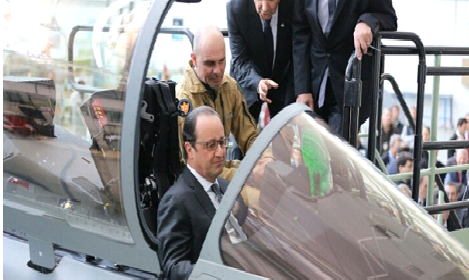Where Is The Rafale Contract? Defence Deal Key To French President's Visit To India
French President Francois Hollande with his government’s flagship, the Rafale fighter jet

NEW DELHI: The Rafale jet fighters deal , hanging fire since the grand announcement by Prime Minister Narendra Modi during his visit to France in April this year, will be the factor determining the visit--or otherwise--of French President Francois Hollande to India as the Republic Day guest in January.
Reports in the Indian media of the invite to President Hollande have still to be confirmed by the French, although usually such announcements are made when the response from the guest has been positive. This would thus, point towards the culmination of the multi-billion deal for the supply of 36 Rafale fighters in ‘ready to fly’ condition.
Negotiations between India and Dassault Aviation for the 126 medium multi-role combat aircraft (MMRCA) started after 2012 after the 30 billion dollar deal coveted by all major defence manufacturers across the globe was awarded to the French company by India. The negotiations became increasingly complicated, and remained stuck in a groove, until PM Modi unilaterally announced during his visit that both had agreed for the supply of 36 , and not the initial 18 ready to fly fighters, in a move that created a stir in both countries.
The Citizen had reported at the time that this unprecedented move the PM had addressed the “critical operational requirements” of the Indian Air Force, but also opened a Pandora’s Box of bonanza’s for the private defence sector where Anil Ambani is ahead of all others, and also sent out a signal of “more to come” to the big powers all eyeing a slice of India’s defence pie. .
The PM’s direct intervention had, thus, effectively closed the earlier file stuck in negotiations between the two sides for three years, and converted the deal into a government-to-government transaction for what is a first for India in its military dealings with France.
However, despite this ‘elevation’ the new file that basically scraps the earlier deal and replaces it with the contract for the 36 read to fly jets has not moved as was anticipated. Earlier the larger deal got bogged down over differences centering around the French resistance to the Indian demand that Dassault take responsibility for the HAL produced fighters and stand guarantee for the same.
Now the deal seems to have got stuck over the offset clause under which the supplier has to invest 50 per cent of the contract cost in India in civil aviation and other such sectors. This cost is basically attached, sources said, to the contract cost and in effect is paid for by the buyer, in this case India. The costs for the fighters have escalated dramatically as a result. The sources said that the French estimates are far higher now than the original cost offered by Dassault when it had bid for the 125 jet fighters deal.
A political push to resolve the deal in August did not succeed, as a result of which French Defence Minister Jean-Yves Le Drian who was scheduled to stop in New Delhi to ink the pact was cancelled. He was to stop by on the way back from a visit to Malaysia in early September but this did not happen. A Memorandum of Understanding between India and France for the Rafale deal has still not been signed.
French President Hollande told reporters earlier "We have big hopes for commercial successes of the Rafale." France has already concluded deals for jets to Egypt and Qatar. and is in talks with the United Arab Emirates and Malaysia. Sources said that it seemed to have been smooth sailing for France in Egypt as well, with three of the 24 fighter jets having already been delivered to Cairo. In contrast, the vastly truncated deal with India has still to materialise.
The announcement of a possible visit by the French President to India on January 26 has again revived expectations about the successful conclusion of the Rafale deal. The French have been visibly upset about the protracted negotiations, with the fine print causing stress all around. There is no announcement as yet about the deal, that in one form or the other has been in the pipeline now for four years without even a MOU being signed.
Terror, of course, will be high on PM Modi’s agenda with the French President. However, now with the Paris attacks and the atmosphere of deep fear and insecurity in Europe, for President Hollande Russia and the U.S carry far more weight and significance insofar as this issue is concerned. The war against terror has assumed different dimensions for President Hollande now, as the attacks on Paris have brought French policy into the realm of direct action where India’s role is limited. France that had joined a US led coalition to oppose Russia’s entry into Syria is now working directly with President Vladimir Putin to bomb Islamic State targets in what amounts to a major reversal in policy.
India that has factored itself out of the West Asian region over the years, carrying little clout with the governments there, is not seen as a major player in the current crisis, according to well placed sources. In fact PM Modi’s concerns with terror stop with Pakistan, according to the sources, with New Delhi remaining as peripheral to the new coalition being led by Russia against Daesh as it was in the US led war against terror.



